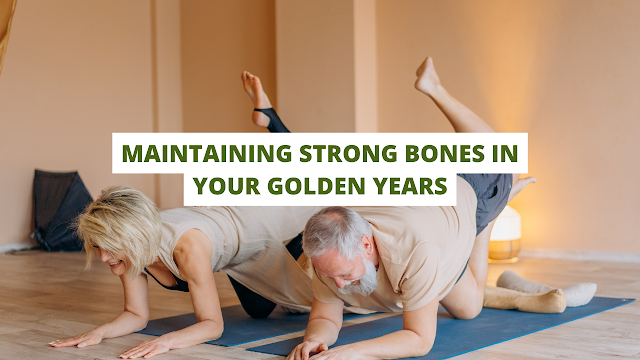The content on this website – including articles, event announcements, personal experiences, and recommendations – is for informational and educational purposes only and is not medical advice. Always consult a qualified healthcare professional before making any changes to your diet, exercise, supplements, sleep habits, or wellness routines, especially if you are pregnant, nursing, on medication, or have any medical condition.
Maintaining Strong Bones in Your Golden Years: A Comprehensive Guide
As we age, one of the most crucial aspects of our health is maintaining strong bones. Our bones provide the structural support for our body, protect vital organs, and store essential minerals like calcium. However, as we enter our golden years, the risk of bone-related issues increases, such as osteoporosis and fractures. In this article, we will explore essential tips to help you keep your bones healthy and strong well into your senior years.
Understanding Bone Health
Before delving into the specifics of maintaining strong bones, let's first understand what bone health entails. Bones are living tissues that constantly undergo a process called remodeling. This process involves the breakdown of old bone tissue and the formation of new bone tissue. During childhood and adolescence, bones form at a faster rate than they break down, leading to overall bone mass growth. However, as we age, this balance shifts, and bone loss can occur, resulting in weaker bones.
The Role of Calcium and Vitamin D
One of the key components of maintaining strong bones is ensuring an adequate intake of calcium and vitamin D. Calcium is the primary mineral that provides strength and structure to bones, while vitamin D helps the body absorb calcium efficiently. Together, these nutrients play a vital role in bone density and overall bone health.
To maintain optimal calcium levels, it is essential to include calcium-rich foods in our diet. Dairy products like milk, cheese, and yogurt are excellent sources of calcium. Additionally, leafy green vegetables such as kale, broccoli, and bok choy, along with almonds and sardines, are also rich in this essential mineral.
Vitamin D, on the other hand, can be obtained through exposure to sunlight and dietary sources such as fatty fish (salmon, mackerel), egg yolks, and fortified products like orange juice and cereals. For those living in areas with limited sunlight, vitamin D supplements may be recommended by healthcare professionals.
1.
A balanced diet is the foundation for maintaining strong bones. Focus on consuming foods rich in calcium, such as dairy products, leafy green vegetables, and fortified cereals. Additionally, include vitamin D sources like eggs, fatty fish, and sunlight exposure to enhance calcium absorption. A well-balanced diet also ensures you receive other vital nutrients like magnesium, phosphorus, and vitamin K, contributing to bone health.
2. Engage in Weight-Bearing Exercises
Regular physical activity plays a crucial role in keeping your bones strong and resilient. Engaging in weight-bearing exercises, such as walking, jogging, dancing, and weightlifting, puts stress on your bones, stimulating them to become stronger. Aim for at least 150 minutes of moderate-intensity exercise each week to promote bone health.
3. Prioritize Strength Training
Strength training exercises are particularly beneficial for seniors as they help increase bone density and muscle strength. Incorporate resistance exercises with dumbbells, resistance bands, or bodyweight to your routine. Focus on major muscle groups and gradually increase the intensity for the best results.
4. Ensure Safety at Home
Preventing falls and accidents at home is crucial to safeguard your bone health. Make your living space safer by removing tripping hazards, using non-slip mats, and installing handrails in critical areas. Regular eye check-ups and keeping your home well-lit can also reduce the risk of falls.
5. Quit Smoking and Limit Alcohol
Smoking can weaken bones and increase the risk of fractures, while excessive alcohol consumption can interfere with calcium absorption. It's essential to quit smoking and limit alcohol intake to protect your bones and overall health.
6. Regular Bone Density Tests
As you age, it's essential to monitor your bone health regularly. Consult with your healthcare provider and schedule bone density tests as recommended. Early detection of bone loss or osteoporosis can lead to timely interventions and prevent further complications.
7. Stay Hydrated
Proper hydration is often overlooked but is crucial for bone health. Drinking an adequate amount of water helps transport nutrients and minerals to your bones, keeping them nourished and functioning optimally.
8. Get Enough Sleep
Quality sleep is vital for your body's ability to repair and regenerate. During sleep, your body works to strengthen bones and tissues. Aim for 7-9 hours of uninterrupted sleep every night to support overall bone health.
9. Consult with Healthcare Professionals:
If you have specific concerns about bone health, it is best to consult with healthcare professionals or a registered dietitian. They can provide personalized advice and recommendations based on your individual needs.
Conclusion
As we journey through life, maintaining strong bones becomes increasingly important. By adopting a balanced diet, engaging in regular physical activity, prioritizing strength training, ensuring safety at home, and making healthy lifestyle choices, you can support your bone health well into your golden years. Regular check-ups and early interventions will help you address any issues promptly. Embrace these habits, and you'll enjoy an active and fulfilling life with strong and resilient bones.
Remember, it's never too late to start caring for your bones. Begin today, and your future self will thank you for it!

.png)


.png)

.png)
